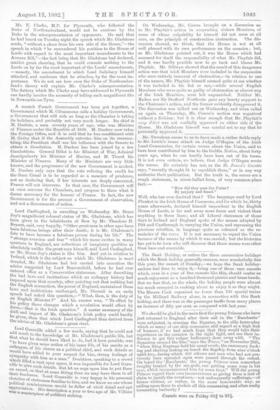Lord Carlingford, in unveiling on Wednesday Mr. Bruce Joy's magnificent
colossal statue of Mr. Gladstone, which has been given to the inhabitants of Bow by Mr. Theodore H. Bryant, said, very happily, " Other great men in other ages have been fabulous beings after their death ; it is Mr. Gladstone's fate to have become a fabulous person during his life." The "strange aversion and fear" which his name excites in many quarters in England, are reflections of imaginary qualities as absolutely unlike the great man himself, said Lord Carlingford, as Mr. Bruce Joy's statue is like him. And yet in relation to Ireland, which is the subject on which Mr. Gladstone is most dreaded, Mr. Gladstone had but carried into execution the advice suggested by Lord Beaconsfield, before he had ever entered office as a Conservative statesman. After describing the bad laws and institutions which an unhappy history had imposed upon that country, after pointing out that nothing but the English connection, the power of England, maintained those Laws and institutions unchanged, Mr. Disraeli in an early speech had asked this question,—" What, then, is the duty of an English Minister P" And his answer was, " To effect by his policy those changes which a revolution would effect by force,—that is the Irish question." A neater summary of the drift and import of Mr. Gladstone's Irish policy could hardly be given, than that which Lord. Carlingforcl thus derived from the advice of Mr. Gladstone's great rival.






























 Previous page
Previous page